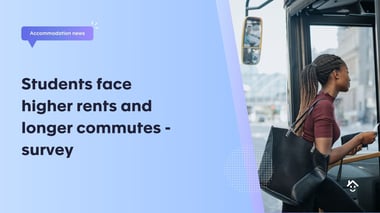The housing minister, Eddie Hughes, has been asked to justify why purpose-built student accommodation (PBSA) landlords are exempt from planned rent reforms that will see every tenancy in the private rental sector moved to a periodic one.
This means that student landlords will be restricted in offering tenants a 12-month contract.
Mr Hughes was questioned by Matthew Offord, the Conservative member for Hendon, who wanted to know why the decision was made under the Fairer Renting White Paper.
Mr Offord said that many private landlords had been annoyed, particularly those who operate student accommodation.
PBSA is distinct from the student private rental sector
Mr Hughes said that the PBSA is distinct from the student private rental sector since it caters to specific student needs, and they are restricted to housing student tenants because of planning constraints and could not offer long-term accommodation.
Mr Hughes added: “Standards in privately managed PBSA abide by government codes that outline the obligation of landlords and set a benchmark for standards in the accommodation they manage.”
He said that code compliance will ensure that disputes and problems can be resolved promptly and 95% of PDSA providers are currently signed up to those codes.
Mr Hughes explained: “Private PBSA providers who have signed up to the government-approved code will be exempt from assured status under our proposed reforms and therefore the new periodic tenancy system.”
Can continue providing efficiently run housing for the academic year
He said that PBSA landlords can continue providing efficiently run housing for the academic year as students are choosing to live in them.
However, landlords with student houses in the private rental sector will not be exempt and students will have to be offered a periodic tenancy that is a fixed length instead of ASTs - even though he admitted that this would be ‘difficult to legally navigate’.
Simon Thompson, the managing director of Accommodation for Students, said: “The government plans for changing tenancies for student landlords may mean many will leave the sector because they will not be able to run their accommodation effectively and prepare for students moving out and new ones moving in.
“At least, the housing minister acknowledges that this is going to be difficult to negotiate legally and student landlords will have to see the detail of the laws for rent reform in the UK before deciding what to do.”
UK’s PRS rents reach record highs
Meanwhile, rents in the UK’s private rental sector have reached record highs thanks to rising interest rates and demand exceeding supply, one survey reveals.
According to Rightmove, their data reveals that in some areas, rents have jumped by more than 20% in the year - in Manchester they rose by 23.4%.
Now, the average rent being advertised outside of the capital is 11.8% higher than it was 12 months ago. In London, rents are up by 15.8% - helped by the return of overseas students.
Rightmove also highlights that rent rises are feeding through to tenants because of rising interest rates as many landlords are on mortgages with tracker rates.
And from 1 April to 30 June, the rent being advertised outside London reached £1,126 per month.
That’s up 19% in two years, or £177 since the pandemic began.
New record average of £2,257
In London, tenants are now facing a new record average of £2,257 for their advertised rent - Rightmove says this is the highest annual increase they have ever recorded for a region.
Their survey reveals that Manchester tops the league table of rental price hotspots with rents rising to £1,127, and Chatham in Kent, saw rent rises of 21.4%, followed by Liverpool with a 19.4% rise.
The figures show that since the pandemic began, tenants are still looking to evaluate where they want to live and what they want from a rented home.
Growing numbers of tenants are opting to live in the suburbs, by the coast or in the countryside.
Rightmove says this helps explain why some of the largest rent rises have been seen in parts of Wales and in many seaside towns.
The figures also underline the dramatic bounce back for London’s rental sector after rents fell by nearly 20% during the pandemic lockdown.
Overseas students and office workers are returning to the capital
Now, overseas students and office workers are returning to the capital and looking for somewhere to live.
News of rising rents coincided with the National Residential Landlords’ Association (NRLA) urging the new Prime Minister to deal with the falling supply of homes to rent in a bid to stop rents spiralling.
Landlords are being forced from the PRS
The NRLA is also warning that many landlords are being forced from the PRS because of the punitive tax rises that were introduced in 2015. The organisation says these now need to be retracted.
The association’s chief executive, Ben Beadle, said: “The last six years prove it was nonsense to cut the supply of rental housing when demand was so strong to make it easier for those saving to buy a home.”
He added that rising rents will leave tenants with less cash for a deposit and the next Prime Minister should reset the government’s plans for the sector.




